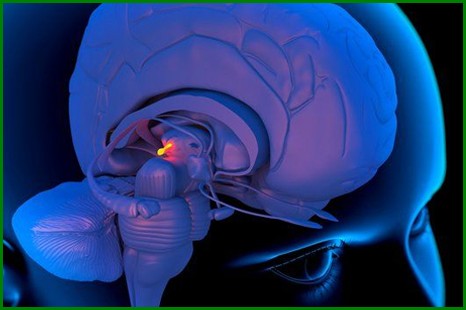More about melatonin Melatonin write very much. Here is the statement given in (1): As a well-known graph of Transylvania, melatonin only comes at night. But unlike Drakuly it enters the bloodstream and safely without fracture and then participates in a variety of biological processes.
Melatonin write very much. Here is the statement given in (1): As a well-known graph of Transylvania, melatonin only comes at night. But unlike Drakuly it enters the bloodstream and safely without fracture and then participates in a variety of biological processes.
Claim that melatonin may fail to smooth rhythms, to treat cancer and depression, and may delay the aging process.
Whether such statements are true? We try to examine the biochemistry of melatonin and all that is known about its effect. What is it?
Melatonin (N-acetyl-5-methoxytryptamine) - a derivative of serotonin, which in turn is synthesized in the body from the amino acid tryptophan. When we consume tryptophan from food, the body converts it into a significant part of serotonin. However, enzymes, heads turning serotonin into melatonin is suppressed lighting.
That is why the production of this hormone occurs at night.
Melatonin allocated melanocytes pineal gland cells under the influence melanotropin peptide hormone secreted by the pituitary gland. Do creatures such fish, frogs and lizards the pineal gland is a light-sensitive organ that acts as a third eye and a control sexual behavior of these animals by altering the production of sex hormones. In humans, until recently, the appointment of the body presents a conundrum. Now it is considered as one of the main centers of the synthesis of hormones. In lower animals melatonin lightens the color of the skin.
Studying this effect, dermatologist Aaron Lerner at Yale University in 1958, isolated from bovine pineal glands of a substance called melatonin for its ability to stimulate the growth of pigment cells (melanophores). Further investigation revealed that the pineal gland secretes this hormone in response to a signal from the sympathetic nervous system. It is particularly interesting that in the process of separation of melatonin directly involved two major neurotransmitters - serotonin and norephedrine. Melatonin stimulates the areas of the nervous system, which stands norephedrine.
In turn, norephedrine affects the pineal gland.
There is some controversy regarding the biological role melanotropnogo hormone and melatonin. It is possible that their functions are largely overlap.
Reproduction and maturity
Apparently, melatonin regulates the onset of the breeding season of animals to offspring born at an auspicious time when natural conditions contribute to its survival. This hormone is often used by scientists to artificially shift the period of sexual activity in laboratory animals. But the man - not an animal: we can mate at any time and in any place ...
In adults, melatonin is not controlled levels of sex hormones, but it plays an important role in the onset of maturity. Here's an example. In the study of children aged 7 to 18 years, researchers found that children younger nocturnal melatonin levels above the daily about 40 times, and after the maturity of the difference is about 10 times.
Theorized that the mechanism of maturation starts decreased nocturnal melatonin secretion. In young children, this hormone has two functions: Increases the duration of sleep and suppresses the secretion of sex hormones.
Melatonin and depression
Since serotonin and norephedrine work as neurotransmitters in neurons of the brain, the lack of one or both of them at once, probably associated with the development of depression. It can be observed or a decrease in the synthesis, or imbalance in the synthesis of these substances. Now depression is treated with special drugs that increase the release of neurotransmitters.
Since melatonin is associated with norephedrine and serotonin, scientists had assumed that he was also involved in the development of certain mental disorders. It is shown that in people with depression, the rhythm of melatonin release greatly disturbed. For example, the peak of production of this hormone comes at a time from dawn until noon instead of the usual 2 am.
At the same ones who suffer more rapid fatigue, the rhythms of melatonin synthesis are changing quite chaotic.
Also found low levels of melatonin link with hyperactivity in manias. In contrast, schizophrenics content of this hormone is often increased.
An interesting observation made in the study of seasonal disorder syndrome. This syndrome is a set of disorders that manifest themselves in a particular season (usually in winter): fatigue, excessive sleeping, depression, increased appetite, cravings for sugar. Theoretically, it should be due to slow metabolism as these manifestations contribute to energy conservation.
However, in practice suffer from the syndrome metabolic rate, on the contrary, increased. Treatment with light effective in this case, slow metabolism.
A proposed mechanism for the phenomenon is that increased levels of melatonin stimulate the deposition of a special type of fat in brown adipose cells. Low light and low ambient temperature provoke release of norephedrine, which regulates heat dissipation. Norephedrine, in turn, stimulates the activity of pineal gland. At low temperature also increases the appetite, causing an increased need for carbohydrates.
Carbohydrate processing require increasing insulin levels, which causes increased excretion of tryptophan. Last converted into serotonin into melatonin, and then, which stimulates the growth of brown adipose tissue. Overcoming failure biorhythms.
Silversun Pickups - Melatonin
Silversun Pickups - 01 Melatonin - Carnavas - 2006
 The consequences of distress or bad stress, but stress as such, because, figuratively speaking, good stress is the foundation of a healthy life, can take years or decades, conclude by Australian scientists.
The consequences of distress or bad stress, but stress as such, because, figuratively speaking, good stress is the foundation of a healthy life, can take years or decades, conclude by Australian scientists.